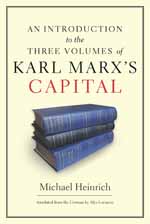M. Heinrich: An Introduction to the Three Volumes of Karl Marx’s Capital
Folgende Ankündigung ist bei MONTHLY REVIEW PRESS erschienen:

Michael Heinrich: An Introduction to the Three Volumes of Karl Marx’s Capital
Paperback, 220 pages
ISBN-13: 978-1-58367-288-4
Cloth (ISBN-13: 978-1-58367-289-1)
Forthcoming in June 2012
„The global economic crisis and recession that began in 2008 had at least one unexpected outcome: a surge in sales of Karl Marx’s Capital. Although mainstream economists and commentators once dismissed Marx’s work as outmoded and flawed, some are begrudgingly acknowledging an analysis that sees capitalism as inherently unstable. And of course, there are those, like Michael Heinrich, who have seen the value of Marx all along, and are in a unique position to explain the intricacies of Marx’s thought.
Heinrich’s modern interpretation of Capital is now available to English-speaking readers for the first time. It has gone through nine editions in Germany, is the standard work for Marxist study groups, and is used widely in German universities. The author systematically covers all three volumes of Capital and explains all the basic aspects of Marx’s critique of capitalism in a way that is clear and concise. He provides background information on the intellectual and political milieu in which Marx worked, and looks at crucial issues beyond the scope of Capital, such as class struggle, the relationship between capital and the state, accusations of historical determinism, and Marx’s understanding of communism. Uniquely, Heinrich emphasizes the monetary character of Marx’s work, in addition to the traditional emphasis on the labor theory of value, thus highlighting the relevance of Capital to the age of financial explosions and implosions.“
Eine positive Rezension wird auch gleich mitgeliefert. Und zwar von Stephan Kaufmann (!) in der „Berliner Zeitung“:
In only 220 pages the author achieves a summary of the three volumes of Capital: explaining the connection between labor, commodities, and money, how surplus value arises, what capital is, the role of banks and stock exchanges, and from where crises arise. Alongside this he manages to fit in the history of Marxism, demystify the ambiguous term dialectic, and throw in a final chapter on the role of the state in capitalism, all the while refuting common mistakes in the Marxian corpus.
Eine englische Kritik „On Michael Heinrich’s blind spot“:
http://www.principiadialectica.co.uk/blog/?p=5763
übrigens ist der autor auch als blogger bekannt: http://emanzipationoderbarbarei.blogsport.de/2012/06/06/on-michael-heinrichs-blind-spot/
Die deutsche Fassung der Kapital-Einführung von Michael Heinrich ist im GegenStandpunkt 2-08 ziemlich grundsätzlich kritisiert worden:
„Wie man „Das Kapital“ nicht schon wieder neu lesen sollte. Zur „Einführung in die Kritik der politischen Ökonomie“ von Michael Heinrich“
(Artikel als HTML-Datei und als PDF-Datei).
Auf der Website Ruthless Criticism wurde jetzt die Übersetzung des GS-Artikels ins Englische veröffentlicht:
How not to do another New Reading of Marx’s Capital. On An Introduction to the Three Volumes of Karl Marx’s Capital by Michael Heinrich